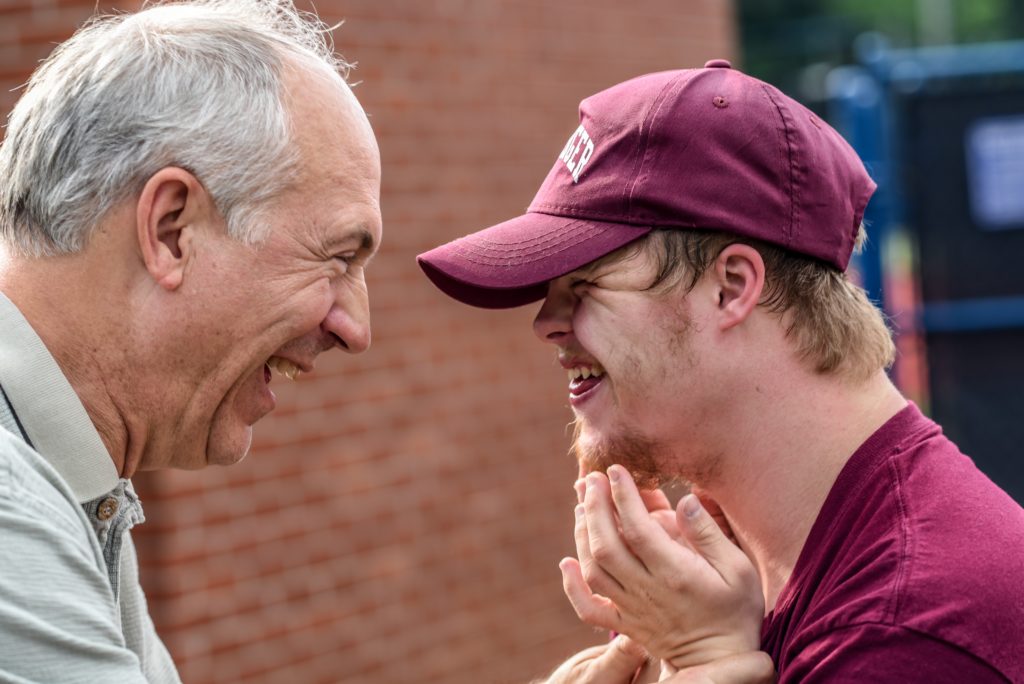
If you’re a church wanting to welcome people with disabilities, here are some practical steps for your church to consider.
By Sandra Peoples
Lifeway Research released the results of their study on the welcoming attitudes of churches toward people with disabilities in March of 2020, right before our world started shutting down because of COVID. I remember reading the findings and carrying my computer into the other room where my husband sat.
“You won’t believe this,” I said, showing him the first stat: “Nearly every pastor (99%) and churchgoer (97%) says someone with a disability would feel welcomed and included at their church.” We were glad to see pastors and churchgoers responding positively, but based on our experience as a special needs family, we knew there is a huge gap between what pastors and churchgoers believe to be true and what special needs families experience.
Nearly every pastor and churchgoer says someone with a disability would feel welcomed at their church, but there is a huge gap between those beliefs and what special needs families experience. — @SandraPeoples Click To TweetMy husband has been a pastor for almost 20 years. He has served in churches in North Carolina, Pennsylvania, and now Texas. I’m sure if asked, the pastoral staff at each of those congregations would have agreed, “A person with a disability would be welcomed at our church.”
But it wasn’t until 11 years ago, when our son was diagnosed with autism, that we looked around our church at the time and realized even though we said they would be welcomed, those families weren’t a part of our church. And we had to take responsibility for figuring out why they weren’t, especially when you consider almost 20% of the U.S. population has a disability—ranging from autism to Alzheimer’s disease.
We realized it wasn’t as simple as putting a ramp to the front door and considering ourselves welcoming. A ramp is a positive step, but it doesn’t meet the needs of everyone with a disability who is longing for a church home.
A ramp at the front door of your church is a positive step, but it doesn't meet the needs of everyone with a disability who is longing for a church home. — @SandraPeoples Click To TweetTo meet our son’s needs and the needs of other families like ours, the church had to take more practical steps toward inclusion and accessibility. If you’re a pastor wanting to go from “we think people with disabilities would be welcomed” to “we know they would be welcomed,” here are some steps to consider.
Make Changes for Accessibility
The study found half of churches (50%) provide an additional teacher to aid a person with special needs in a class. This is very important to families who have children with disabilities. The goal is to communicate the gospel to them in a way they understand in an environment where they feel comfortable. There are three options your children’s ministry could incorporate to be more accessible: you could have buddies (or aids), a sensory-friendly classroom, or a hybrid of both.
The goal is to communicate the gospel to children with disabilities in a way they understand in an environment where they feel comfortable. — @SandraPeoples Click To TweetWe find an example of the buddy model in Scripture when God called Moses to speak before Pharaoh. Moses said he could not because he was slow of speech, so God provided Aaron as a helper. Many children can be part of a class of their peers with just a little help from a buddy/aid.
Other children, including my son James, feel more comfortable in an environment that takes their sensory needs and cognitive ability level into consideration. For these students, a classroom designed for them is best. Our church has both buddies and a sensory room and finds it to be the most effective way to include as many children as possible.
If your church hasn’t yet taken this step, pray God will show you resources that may already exist in your church, like people with experience working with children with disabilities, and see how you can set them up to serve!
Provide Financial and Personal Care
Most of those surveyed said their church provides financially for families with ongoing needs (70%) or provides respite for family caregivers to give them a break (60%). This is such a blessing to families. In some states, like Texas, the waiting list for financial and personal care help is almost two decades long.
The church has a great opportunity to provide practical help for families in need. This can include offering respite nights (our church does four a year), paying bills, and connecting family members to Christian counseling. This not only serves the person with a disability, but the entire family as well.
My husband and I may never be empty nesters because our son will be dependent on us for care into adulthood. We need to invest in our marriage to keep it as strong as possible. Care for typical siblings in special needs families is also important. They benefit from respite opportunities and counseling as well. Even having a friend text to make sure my teenage son has a ride home from a youth group event, so I don’t have to get out of the house after my younger son’s bedtime is a huge blessing for us.
The apostles chose seven men to meet the practical needs of the church family so no one went without. Churches today can meet needs and advocate for groups that are often overlooked. — @SandraPeoples Click To TweetThe biblical model I look to for the importance of offering this practical help is Acts 6:1-7, when the Hellenistic widows were being neglected during the daily distribution. The apostles chose seven men who would help meet the practical needs of the church family so no one went without. In the same way, churches today can meet needs and advocate for groups that are often neglected or overlooked.
Create Classes and Events for the Community
Fewer pastors (29%) say their church provides classes or events specifically for people with disabilities. We consider special needs families an “unreached people group” since so few attend church regularly. We do outreach events and train all our people to be “missionaries” to families they meet in the community.
In addition to respite nights, we’ve done outreaches such as a sensory friendly movie at the local theater and family photo sessions with a photographer who has experience with people with special needs. We also open our church building to host community support groups, which is a great way to get people in the door so they can see our sensory-friendly spaces.
We consider special needs families an "unreached people group" since so few attend church regularly. — @SandraPeoples Click To TweetWe work closely with our school district who is open to advertising our events for us because of the reputation we have in our community of being an accommodating church. With fewer pastors saying they offer these events and services, it could really make a difference if your church was open to reaching out and blessing families with these options.
In my role as the special needs ministry consultant for the Southern Baptists of Texas Convention, I’ve seen our churches take these steps and more to connect people with disabilities and their families to the gospel and to a church home. As 1 Corinthians 12 teaches, our one church body is made of many members, and we are incomplete without members with disabilities being included so they can grow in their faith, to serve with the gifts God has given them. I’m excited that churches feel optimistic about their accessibility and pray they will take these practical steps to make sure special needs families feel optimistic as well.

Sandra Peoples
Sandra (M Div, PhD student) is the disability ministry consultant for the Southern Baptists of Texas Convention, an adjunct instructor for Liberty University, and the author of Unexpected Blessings: The Joys and Possibilities of Life in a Special-Needs Family. She and her family live outside of Houston, TX.












